|
|
|
Sort Order |
|
|
|
Items / Page
|
|
|
|
|
|
|
| Srl | Item |
| 1 |
ID:
155315
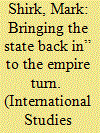

|
|
|
|
|
| Summary/Abstract |
Through most of the seventeenth century, European states used an “imaginary” boundary in the Atlantic referred to as “the line” to cordon off the affairs of Europe from those in the New World. The line structured colonial rule, captured in the phrase “there is no peace beyond the line.” However, by the middle of the eighteenth century, the idea of “the line” no longer held. Common explanations ranging from the rise of capitalism, technology, and interstate competition do not explain this shift. Instead, I argue that the “golden age of piracy” was instrumental. In giving this explanation, I argue that the empire turn in IR has under-theorized the tensions between state and empire in the modern era. I introduce the state–empire hybrid polity as one that is constantly mediating the tensions between the difference characteristic of empire and the integration of the state. “The line” was how European states mediated this tension in the seventeenth century. Pirates took advantage of the open markets and ungoverned spaces inherent in the line, causing a crisis in colonial rule. To defeat piracy and make the world safe for trade, these tensions needed to be remediated and “the line” transformed. As an unintended consequence, this put further strain on England’s North American empire.
|
|
|
|
|
|
|
|
|
|
|
|
|
|
|
|
| 2 |
ID:
155324
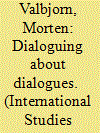

|
|
|
| 3 |
ID:
155320
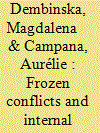

|
|
|
|
|
| Summary/Abstract |
The complex architecture of fragmented authority in the international system remains under-theorized. Understanding the world of separatist regions that turn into de facto states is high on the research agenda. While patron states are said to be a necessary condition, we argue that it might not be a sufficient one to explain the varying degrees of survival/endurance of de facto states. This analytical essay is an effort to establish directions for research that would better account for the variation among cases by integrating their internal dynamics with what we already know about the role of external factors. Adopting a political sociology perspective, this article focuses on understudied aspects of internal processes and points to the role of local elites in state and nation-building during civil wars and after violence declines. We contend that such a perspective helps to account in a more comprehensive way for the processes underlying the status quo while, at the same time, analyzing the interplay between external and internal dynamics of frozen conflicts. We show that students of de facto states would gain from employing literatures on state-building and nation-building to articulate an analytical framework that would reassess the role of local elites in building a state and a nation, and analyze the societal (un)responsiveness as well as the strategies of passive or active accommodation, resistance or opposition within de facto states' populations.
|
|
|
|
|
|
|
|
|
|
|
|
|
|
|
|
| 4 |
ID:
155322
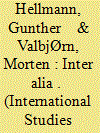

|
|
|
|
|
| Summary/Abstract |
The field of IR has been described as an “‘inter’-type discipline,” in the sense that it is devoted to studying the interactions of different kinds of international actors (Lapid 1996, 10). However, despite the fact that the discipline has never been blind vis-à-vis the “in-between” (or relational) dimension of the subject matter (Kaiser 1971, 791; Rosenau 1990, 40–42; Kratochwil 2007, 502–3), much of the focus in recent years’ discussions has, in various ways, been directed to the inter-national in IR-theory. While acknowledging that this has alerted the discipline about the prevalent Western-centrism in much IR-theory and how it helped foster an awareness of the diversity of IR-communities around the globe, the present forum takes its point of departure in the view that in order to make the academic field of IR-theory worthy of its own name, it is now time to move the debate about global IR (Acharya 2014) a step further and connect it to what has been unearthed in recent decades’ mapping of IR around the globe. To succeed in this endeavor, this forum suggests that it is necessary to both refocus and recalibrate the “inter” in IR-theory. Thus, in addition to bringing attention back to the inter-national dimension of IR-theory, it is also necessary to examine the conditions that determine how relevant actors (e.g., scholars and practitioners) interact in producing knowledge about “the international,” that is, the forms, formats, and foci of intellectual interactions (cf. Rösch and Watanabe 2016; Acharya 2016).
|
|
|
|
|
|
|
|
|
|
|
|
|
|
|
|
| 5 |
ID:
155323


|
|
|
| 6 |
ID:
155325


|
|
|
| 7 |
ID:
155326


|
|
|
| 8 |
ID:
155318


|
|
|
|
|
| Summary/Abstract |
’The post–Cold War peace dividend has been spent; the perception of the global strategic environment is one based in uncertainty with multiple, simultaneous, and diffuse threats wherein “crisis” is constant, conflict is pervasive, and instability is contagious. In such a dynamic, complex, and volatile environment, it is necessary to develop a comprehensive risk assessment mechanism to focus attention, funnel resources, and drive activities prior to acute instability. By leveraging existing academic and DoD forecasting models with diverging strengths and weaknesses, this framework will map the social and structural factors that shape the character of instability to depict states in which there is a volatile environment; identify the destabilizing conditions and existing friction points that are likely to drive the development of instability; and detect specific triggering events and tipping processes that could aggravate those conditions and ignite acute instability.
|
|
|
|
|
|
|
|
|
|
|
|
|
|
|
|
| 9 |
ID:
155321


|
|
|
|
|
| Summary/Abstract |
The field of IR has been described as an “‘inter’-type discipline,” in the sense that it is devoted to studying the interactions of different kinds of international actors (Lapid 1996, 10). However, despite the fact that the discipline has never been blind vis-à-vis the “in-between” (or relational) dimension of the subject matter (Kaiser 1971, 791; Rosenau 1990, 40–42; Kratochwil 2007, 502–3), much of the focus in recent years’ discussions has, in various ways, been directed to the inter-national in IR-theory. While acknowledging that this has alerted the discipline about the prevalent Western-centrism in much IR-theory and how it helped foster an awareness of the diversity of IR-communities around the globe, the present forum takes its point of departure in the view that in order to make the academic field of IR-theory worthy of its own name, it is now time to move the debate about global IR (Acharya 2014) a step further and connect it to what has been unearthed in recent decades’ mapping of IR around the globe. To succeed in this endeavor, this forum suggests that it is necessary to both refocus and recalibrate the “inter” in IR-theory. Thus, in addition to bringing attention back to the inter-national dimension of IR-theory, it is also necessary to examine the conditions that determine how relevant actors (e.g., scholars and practitioners) interact in producing knowledge about “the international,” that is, the forms, formats, and foci of intellectual interactions (cf. Rösch and Watanabe 2016; Acharya 2016).
|
|
|
|
|
|
|
|
|
|
|
|
|
|
|
|
| 10 |
ID:
155319


|
|
|
|
|
| Summary/Abstract |
Moscow’s annexation of Crimea and meddling in eastern Ukraine are the latest signs of Russia’s increasingly assertive behavior in the post-Soviet space. Not surprisingly, Moscow’s actions have become the source of much debate. This article maps the fast-growing literature on the subject and assesses four types of explanations: (1) decision-maker explanations focusing on Putin’s personality traits and worldviews; (2) domestic political accounts emphasizing the Kremlin’s efforts to deflect attention from internal failures; (3) ideational accounts explaining Russia’s near abroad assertion with reference to its national identity and desire for international status; and (4) geopolitical accounts highlighting power and security considerations. The article shows that each approach offers some valuable insights but fails to provide a convincing stand-alone explanation. It is argued that to overcome the identified shortcomings, scholars need to devote more attention to building synthetic accounts. A theoretical model is outlined that specifies how geopolitical pressures, ideas, domestic political conditions, and decision-maker influences interact in shaping Russia’s near abroad policy.
|
|
|
|
|
|
|
|
|
|
|
|
|
|
|
|
| 11 |
ID:
155317
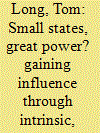

|
|
|
|
|
| Summary/Abstract |
In recent years, scholars have devoted increased attention to the agency of small states in International Relations. However, the conventional wisdom remains that while not completely powerless, small states are unlikely to achieve much of significance when faced by great power opposition. This argument, however, implicitly rests on resource-based and compulsory understandings of power. This article explores the implicit connections between the concept of “small states” and diverse concepts of power, asking how we should understand these states’ attempts to gain influence and achieve their international political objectives. By connecting the study of small states with more diverse understandings of power, the article elaborates the broader avenues for influence that are open to many states but are particularly relevant for small states. The article argues that small states’ power can be best understood as originating in three categories: “derivative,” collective, and particular-intrinsic. Derivative power, coined by Michael Handel, relies upon the relationship with a great power. Collective power involves building coalitions of supportive states, often through institutions. Particular-intrinsic power relies on the assets of the small state trying to do the influencing. Small states specialize in the bases and means of these types of power, which may have unconventional compulsory, institutional, structural, and productive aspects.
|
|
|
|
|
|
|
|
|
|
|
|
|
|
|
|
| 12 |
ID:
155316


|
|
|
|
|
| Summary/Abstract |
The goal of this paper is to present a broad yet systematic framework for thinking about the role of popular culture (PC) in international conflict management and resolution, from an International Relations perspective. Protracted conflicts often involve a non-material dimension, as they become central elements in the rival states’ sense of identity, and as societies develop over time strong beliefs about the conflict, which help sustain it over time. Popular culture can play an important role in shaping and changing this non-material dimension of international conflicts. This is largely due to the unique characteristics of PC products that can reach a large number of people, and can convey both information and emotions. Despite this potential, the role of PC in international conflicts has not been systematically analyzed, due to internal divides within the field of IR between positivist and critical understandings of what PC is and how it should be studied, and due to the very interdisciplinary nature of PC and its operation, which leads to many discussions of PC within different disciplines that do not engage each other. The paper examines the multiple roles that PC can play in the context of protracted conflicts. It examines its role domestically within states–societies that live under conflict; the role of PC as a foreign policy tool used by governments vis-à-vis the publics of their rival; the role and limits of PC in challenging conflicts and facilitating transitions to peace; and finally the impact of the joint consumption of global PC by citizens of states in conflict. These different roles of PC are illustrated throughout with examples from different protracted conflict around the world. The goal of this framework is to serve as a focal point for research that transcends the disciplinary divides and allows for fruitful engagement.
|
|
|
|
|
|
|
|
|
|
|
|
|
|
|
|
|
|
|
|
|